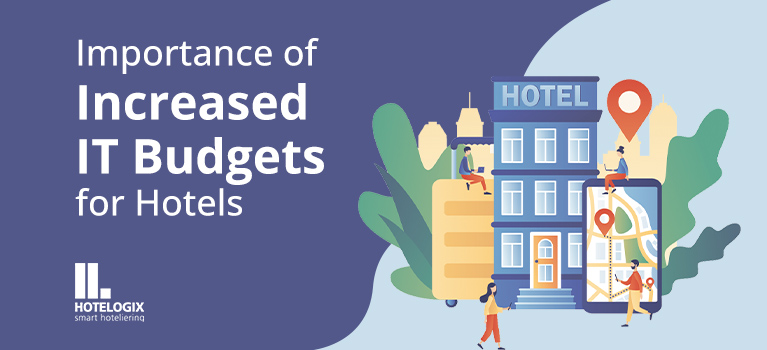Yes. You read it right. It indicates that hotels are finally gearing up to pay attention to IT as part of their core corporate strategy. And why not? After all, IT is critical to their overall growth and also is a significant revenue driver. According to HT’s 2023 Lodging Technology Study, hotels across the globe allocated a little more than 4% of their overall revenues towards IT in 2022. A year ago, in 2021, it was less than 3%. In this blog, we will examine how hotels are currently looking at IT budgets and how they plan to go about it.
What does it look like in 2023?
During 2021 and 2022, technology helped hotels survive and revive while dealing with evolving guest expectations, business dynamics, and staff shortages. That’s why about 69% of hotels plan to spend more on IT in 2023. Regarding planned changes for enterprise software, in 2023, about 69% of hotels will either invest in a new or upgrade to a new Hotel Property Management System (Hotel PMS).
What are hotel groups doing about their IT requirement?
Hotels in this segment are growing big across the globe. It means they are expanding their portfolios everywhere. They either set up their properties or acquire independent properties through management deals. Now, this is where they need technology the most, to be more precise, a cloud-based multi-property management system.
Why a multi-property management system?
In this era of digitisation, hoteliers or the management of a group must maintain their grip over operations across their member properties. With a multi-property management system, they can –
- Gain centralised control over the group operations.
- Monitor all their member properties and their positions from a single dashboard.
- Access the central guest history to know their past preferences and offer them customised services.
- Manage group-wide reservations for all their properties from the central call centre.
- Access group-wide, enterprise-level reports to make data-driven business decisions.
Rapid expansion
The business and operational benefits of a cloud-based multi-property management system for hotel groups are not restricted, as mentioned above. The best part is that, as experienced by most of our customers, it helps them with their expansion plan. Simply put, it allows them to add new properties and go live with them quickly.
Here is a testimony to what we just said.
“With Hotelogix, it has been a breeze for us to plug in and integrate a new property as part of our corporate operations. We are able to go live with a new property within three days.”
– Deepika Arora, Founder, Rosakue Hospitality, India
Currently, Rosakue Hospitality runs 12 boutique and lifestyle properties across India.
Revenue generation
It is one of the most significant benefits any hotel group would like to experience. A multi-property management system’s in-built dynamic pricing module can automatically change room rates to the maximum by considering a property’s occupancy and availability. Moreover, it can integrate with leading revenue management solutions to suggest the best rates based on market demand, competition pricing, etc. Furthermore, the solution also allows the management to configure multiple packages and deals for their member properties to sell more rooms and increase occupancy.
You don’t have to take our word for it. See what one of our customers with four premium properties has to say about it.
“Hotelogix enables us to tailor a variety of deals just for business travellers. These bundles are so attractive that they even help travel agencies gain new clients. As a result, our company’s income has increased by more than double since 2019.”
– Akanksha Garg, Founder Director & CEO, Waxpol Hotels and Resorts, India
Efficient distribution
For hotel groups, ensuring real-time online distribution across multiple properties could be a pretty challenging task. Manually updating OTAs is a time-consuming and error-prone affair. It leads to mismatched rates/availabilities across OTAs, overbookings, and double bookings. But integrating a multi-property management system and a channel manager solves all these issues. It automates the process of updating availability and rates on OTAs in real time. As a result, hotels save time while increasing their distribution efficiencies for more OTA bookings.
Here is one more example of what we just said. It comes from the Philippines-based Millennial Resorts that runs five properties.
“The Hotel PMS and channel manager integration ensures the real-time update of rates and availability across all the OTAs. Due to this automation, we are saving 90% of the time handling OTA bookings. Plus, there are no more double-bookings and overbookings to deal with.”
– Teddy R. Tenerife, IT Manager, Millennial Resorts, Philippines
Like any other industry, the hotel also looked at digital technologies as a mechanism to keep the business running while dealing with pandemic-related uncertainties. Technology is helping them in this post-pandemic time to recover entirely in 2023. For hotel groups, the trick lies in having the right strategy in place, allocating more towards IT budgets for the overall growth of their enterprises.
Planning to invest in IT for your hotel group?
Do it right with a multi-property management solution.


